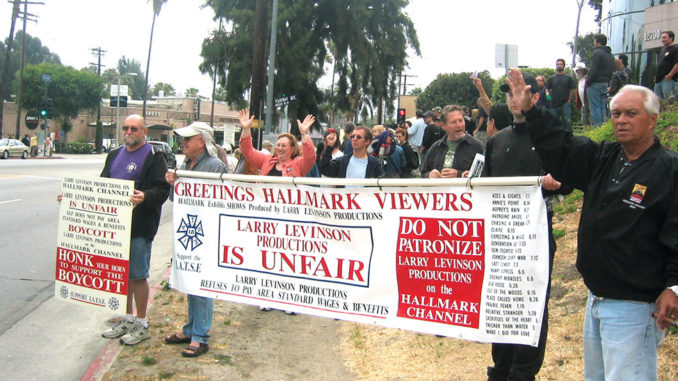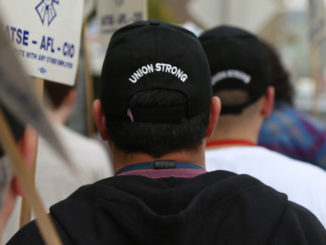
by Rob Callahan

Usually, when the crew of a non-union show decides to organize, much preparation goes into readying for an action that is itself quick and decisive. For weeks––sometimes months––the union researches the producing company and scrutinizes the production schedule to determine how and when the crew would have the most leverage. Crew members and union staffers have quiet conversations with the employees of various departments, gauging their level of support for organizing the show. Meetings are held to discuss strategy. Members of the crew sign cards and, most importantly, commit to bringing work on the show to a halt should it become necessary and should they have the leverage to do so.
Having done all this homework in advance, the crew is ready to take action. When the appropriate time comes, the crew presents the producer with a simple and stark choice: Sign a union contract or abandon production of the show. Generally, when production and post-production employees together walk off a job, the producers agree to a union deal almost immediately. IATSE strikes usually end before anyone even hefts a picket sign.
But not every job action proceeds so quickly.
On March 23 of this year, members of the production crew of The Storm gathered for a meeting before their afternoon call time. Larry Levinson Productions (LLP) was producing the $9 million miniseries for NBC. LLP, which turns out dozens of movies-of-the-week and direct-to-video pictures each year, has contracts with DGA, SAG and WGA, but steadfastly refuses to sign an IATSE agreement. Moreover, this union-busting employer is notorious for its paltry pay, grueling hours, lack of benefits and hazardous working conditions. The crew of The Storm, most of whom had worked on many previous LLP gigs, was fed up, and collectively decided to walk off the job in order to win a union contract. Thus began a fight that continues to this day.
At press time, LLP remains non-union, and still offers its crew wages and working conditions much worse than industry standards. Throughout this action, Levinson has refused to negotiate. Although the labor dispute has cost and continues to cost LLP large sums, he seemingly would rather wait the union out than negotiate peace. The production crew succeeded in calling employees from other LLP shows and ensuring that they did not cross the line to replace striking workers, but LLP eventually managed to assemble a skeleton crew of unskilled scabs. The scab crew muddled along and, after many delays and fiascos, finally completed work on The Storm. The fact that most of the post-production staff continues to service the company further contributes to Levinson’s recalcitrance.
For weeks, committed Guild members carried picket signs and held the line alongside striking LLP employees. It has been a powerful reminder of what a union is all about.
The dispute with LLP has entered a new phase. At the end of May, the IATSE held a rally outside of the offices of the Hallmark Channel. Hallmark regularly contracts with Larry Levinson to produce the channel’s movies-of-the-week, and the IATSE sent a clear message that a company focused upon family-friendly programming ought to ensure that its shows are made by companies friendly to working families. Compensation a little better than minimum wage, a lack of health care coverage, onerous hours and unsafe working conditions are all anathema to the family values the Hallmark Channel promotes. This new phase of the struggle is guided by the principle that those who do business with LLP should be educated about the abusive practices their business promotes.
Although the struggle is ongoing, we can already derive a number of lessons from this fight. One is that the fates of post-production and production employees are inextricably intertwined; even though those working in the edit bays may have no direct contact with those working on set, we can only win when everyone acts in concert. Another lesson is that our leverage must consist of more than just our ability to deny an employer a source of labor; we need to think creatively to find other legal ways to disrupt an employer’s business.
While this fight has proven difficult and remains incomplete, there are encouraging lessons to take away from this job action as well. Among these is the inspiring resolve of the striking crew. Even after weeks on the picket line, these young craftspeople maintained their commitment. They knew they deserved to be treated better, and they knew they needed to fight for a future in which they could have sustainable careers in this industry.
This union-busting employer [LLP] is notorious for its paltry pay, grueling hours, lack of benefits and hazardous working conditions.
Another encouraging lesson is that Guild members are willing to take a stand in support of their striking brothers and sisters. A call went out to Local 700 members to help reinforce the picket line, and scores answered. Even though they had never worked for LLP and never intended to, Guild members understood solidarity and knew that the fight for fairness at LLP had consequences for everyone working in the industry. For weeks, committed Guild members carried picket signs and held the line alongside striking LLP employees. It has been a powerful reminder of what a union is all about.
Lastly, the dispute with LLP serves as an object lesson that the law makes it too easy for employers to thwart the will of their workers. If the Employee Free Choice Act, now under consideration by Congress, is enacted as law, an employer such as LLP would be legally bound to negotiate a contract when a majority of its employees sign cards demanding union representation.
Senator Dianne Feinstein (D-CA), an erstwhile supporter of this legislation, now wavers in her commitment to this crucial reform of federal labor law.
On behalf of your sisters and brothers who walked off the set of The Storm, I ask you to take part in the IATSE’s campaign to win Senator Feinstein’s backing for workers’ right






